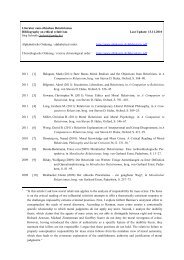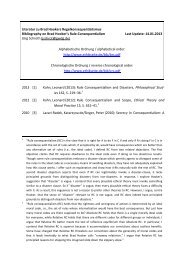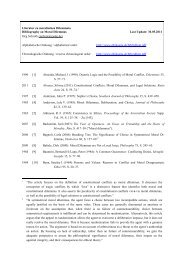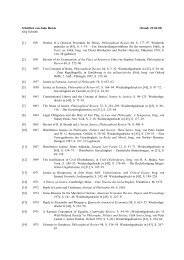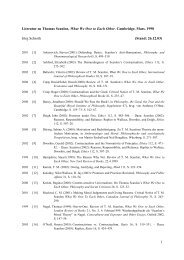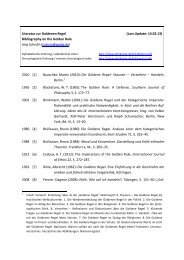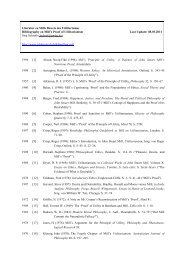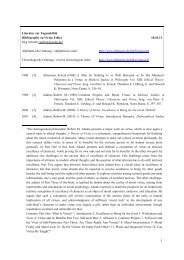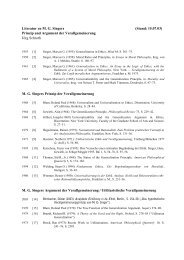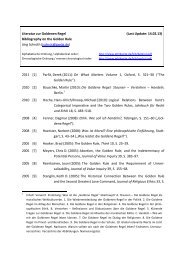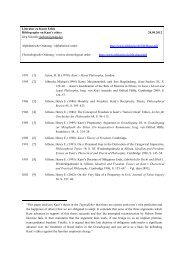Chronologische - Ethikseite
Chronologische - Ethikseite
Chronologische - Ethikseite
You also want an ePaper? Increase the reach of your titles
YUMPU automatically turns print PDFs into web optimized ePapers that Google loves.
2005 [424] Timmons, Mark (2005): The Philosophical and Practical Significance of Kant’s Universality<br />
Formulations of the Categorical Imperative, in Jahrbuch für Recht und Ethik 13:<br />
Philosophia Practica Universalis. Festschrift für Joachim Hruschka zum 70.<br />
Geburtstag, hrsg. von B. Sharon Byrd und Jan C. Joerden, Berlin, S. 313–33.<br />
2005 [425] Uniacke, Suzanne (2005): Responsibility and Obligation: Some Kantian Directions,<br />
International Journal of Philosophical Studies 13, S. 461–75. 121<br />
2005 [426] Westphal, Kenneth R. (2005): Kant, Hegel, and Determining Our Duties, in Jahrbuch für<br />
Recht und Ethik 13: Philosophia Practica Universalis. Festschrift für Joachim<br />
Hruschka zum 70. Geburtstag, hrsg. von B. Sharon Byrd und Jan C. Joerden, Berlin,<br />
S. 335–54.<br />
2005 [427] Wood, Allen W. (2005): Kant, Oxford [Erschienen 2004], S. 129–50 (“Ethical Theory”).<br />
2004 [428] Ameriks, Karl (2004): Kant und das Problem der moralischen Motivation, in Kants Ethik,<br />
hrsg. von Karl Ameriks und Dieter Sturma, Paderborn 2004, S. 98–116.<br />
2004 [429] Ameriks, Karl/Sturma, Dieter (Hrsg.) (2004): Kants Ethik, Paderborn.<br />
2004 [430] Bartuschat, Wolfgang (2004): Kant über Grundsatz und Grundsätze in der Moral, Jahrbuch<br />
für Recht und Ethik, Band 12, hrsg. von B. Sharon Byrd, Joachim Hruschka und Jan<br />
C. Joerden, Berlin, S. 283–98.<br />
2004 [431] Biller-Andorno, Nikola (2004): Die Kantische Moraltheorie im Kontext der modernen<br />
Medizinethik, in Angewandte Ethik im Spannungsfeld von Begründung und<br />
Anwendung, hrsg. von Hans Friesen und Karsten Berr, Frankfurt a. M., S. 295–308.<br />
2004 [432] Coeckelbergh, Mark (2004): The Metaphysics of Autonomy. The Reconciliation of Ancient and<br />
Modern Ideals of the Person, Houndmills, S. 147–68 (“Hill’s Ideal of Autonomy”), S.<br />
the philosophical resources to distinguish between willing something as a means and as an end, leaving<br />
means only, and destroying transparency.”<br />
121 “This paper asks how we should conceptualize the relationship between responsibility and obligation. Its<br />
central concern is the relevance of considerations of obligation to the attribution of responsibility for what<br />
we do or bring about. The paper approaches this issue through an examination of Kant’s complex,<br />
challenging and instructive theory of responsibility, in which strict obligation plays a pivotal role in<br />
attributions of responsibility for the outcomes of our actions. Even if we do not accept Kant’s strongly<br />
juridical concept of responsibility, his theory provides insight into the way in which we should see the<br />
connection between responsibility and obligation.”



